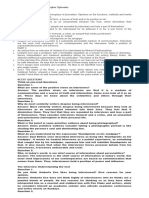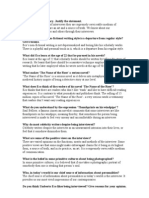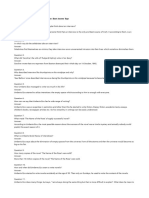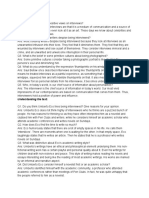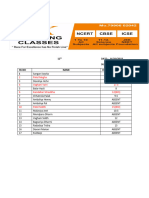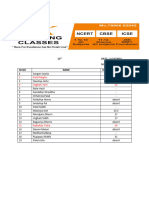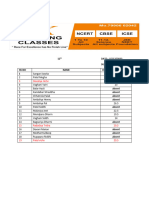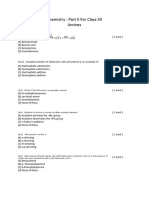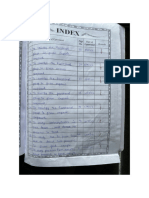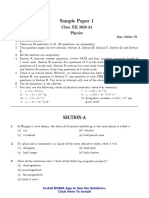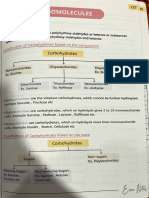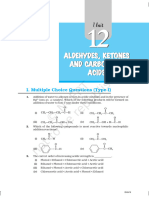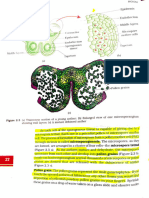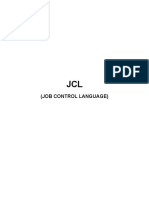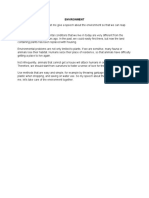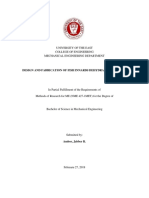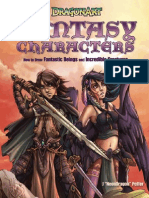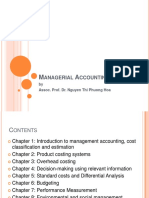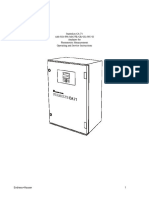Lesson : The Interview
Answer the following questions:
Q1. What are some of the positive views about the Interviews?
Despite several negative opinions of various celebrities, the Interview is a genre that become a common place of
Journalism. It is an art that brings out truth and vivid description of the person being interviewed. It is an
extremely useful medium of communication.
Q2. Why do most celebrities despise being interviewed?
Or
Why do celebrities find fault with an interview?
Most of the celebrities avoid being interviewed because they firmly believe that interviews leave a disparaging
effect on their personalities. They consider them as unnecessary intrusion into their personal lives. Writers like VS.
Naipaul feels being wounded by interviews. Rudyard Kipling condemns them as immoral, while Saul Bellow
feels a sense of suffocation during the course of interview.
Q3. What is the belief in some primitive cultures about being photographed?
Some primitive cultures have great apprehension against being photographed. They don't prepare themselves
readily for getting themselves photographed as they hold a fallacious belief that it could steal one's soul.
Q4. What do you understand by the expression "thumbprints on his windpipe"?
Saul Bellow compares the experience of being Interviewed to ‘thumbprints on the windpipe’. This expression
reveals the feeling of suffocation that one goes through during the course of his interview. The interviewee feels
as if his throat is being strangulated by the interviewer.
Q5. What in present day world, is our chief source of information about great personalities?
Ever since the invention of interviews, interviews have been the chief source of information about celebrities and
great personalities. What biographers and autobiographers reveal in long voluminous books, interview conveys in
for lesser time and with greater clarity.
Q6. How does Umberto Eco find time to write so much?
Umberto Eco believes in catching hold of the time. He takes care of the minutes and his hours take care of
themselves. Most people ignore the gap of time between two pieces of work which he names 'interstices'. Eco
utilises this gap of time. So he finds time to write so much.
Q7. How is Umberto Eco's style of writing non-fictional scholarly work different from the regular academic style?
Regular academic style of writing is totally dull, drab, boring and depersonalised. Eco's style is absolutely
informal, playful with a touch of narrative style. He narrates the story of research with all trials and errors. His
research work has the quality of creative writing, which makes an informative as well as an interesting reading.
�Q8. Did Umberto Eco like to be identified as a novelist?
Or
Did Umberto Eco consider himself a novelist first or an academic scholar?
Basically Umberto Eco was a professor in the University of Bologna in Italy and had already acquired a
formidable reputation as a scholar for his ideas on semiotics. In 1980, he acquired the equivalent of intellectual
stardom with the publication of 'The Name of the Rose’-a novel. But Eco considered himself an academic scholar
first. He remarks about himself also "I consider myself a university professor who writes novels on Sunday."
Q9. What reason do you find for the huge success of the novel "The Name of the Rose"?
It is not so easy to find a reason for the huge success of the novel "The Name of the Rose". As Eco himself calls
its success a mystery. It is most likely that the detective story delving into metaphysics, theology and medieval
history interested the readers of that particular time period. It wouldn't have been the same if written ten years
earlier or ten years later.
Q10. What are the drawbacks of an interview?
First of all, interview is an encroachment upon the private life of an individual. Most of the time it is an ordeal for
the celebrity, as he/she has to answer such question he/she doesn't wish to answer. It is condemned for its,
diminishing effect. At times it is dreaded because it 'lionizes' the subject. Sometimes, it wounds and at other times
it robs one of a part of oneself.
011. Why is interview a supremely serviceable medium of communication?
Though the interview is condemned by majority of celebrities, it still is the supremely serviceable medium of
communication, as it gives us a peep into the mind of the celebrity. It acquaints the common public with his
thought pattern. The revelations made through this medium are spontaneous, so truthful and sincere.
Q12. Umberto Eco's staggeringly large and wide-ranging work puzzles everybody. What does the scholar have to
say about it?
Being a modest and humble man, Umberto Eco tells the journalist that it is a fallacious impression that he does
many things. In fact, he has a few philosophical ideas and keeps on pursuing them in different works. However,
he doesn't hesitate to share the secret of accomplishing so much of work by revealing that he utilises the time gaps
between two pieces of work which he calls 'interstices'.
Q13. What does Umberto Eco mean by eliminating empty spaces from the universe and our lives?
Umberto Eco intends to say that as by removing the empty spaces from the universe, the world will shrink and
become compact. Similarly, in life too there are empty spaces in between two pieces of work which he calls
'interstices'. By utilising these empty moments, we can have much more time than we actually think we have.
Q 14. What is meant by 'Interstices'? How does Umberto Eco utilise the 'Interstices'?
�Speaking literally 'Interstices' means 'crevices', 'cracks' or 'gaps'. Umberto Eco uses the term as gap or space
between two pieces of work. He utilises these empty spaces to plan and sketch out whatever work he has to take
up next. That is the secret of his doing so many things.
Q15. Umberto Eco, with reference to "The Name of the Rose" says, "I think if I had written The Name of the
Rose ten years earlier or ten years later, it wouldn't have been the same." What could he have meant?
When Umberto Eco says - "I think if I had written The Name of the Rose ten years earlier or ten years later, it
wouldn't have been the same."- he could have meant that the success of the book was largely due to timing. If he
had written the book earlier or later, it might not have been as relevant or timely and might not have got the same
level of attention and interest, and so, it wouldn't have had the same impact.
Long Answer Type Questions:
01. Different celebrities condemn the interview in their respective manner. Do you think they are justified?
Celebrities like V.S. Naipaul. Lewis Carroll, H.G. Wells. Rudyard Kipling and Saul Bellow have expressed their
strong contempt for interviews. They even go to the extent of calling them-a 'crime', 'an assault', 'thumbprint on
one's windpipe' and so on. No doubt, they are justified up to a considerable extent, as the interviews rob the great
personalities of their privacy. They in someway encroach upon the private region of their lives and at times they
project them to be lesser than their stature and at other times 'lionize' them. Despite all these drawbacks, one can't
justifiably condemn interviews out right. Interviews have their own place. After all these are the interviews only
which give us an insight into the personalities of the celebrities. They bring to light the truth about them which
works as an inspirational source for the masses. The fan-following of the celebrities gets a sense of pleasure and
satisfaction when they have a glimpse of their role-models' inner selves from close quarters. And the interviews
leave behind an indelible imprint on them. No doubt the interview is a 'Supremely serviceable medium of
communication' and hence they don't deserve to be condemned altogether.
Q2. Give a pen portrait of Umberto Eco on the basis of the chapter "The Interview".
Umberto Eco is a professor at the University of Bologna in Italy. He has an authority on semiotics (the study of
signs). He has acquired a formidable popularity as a scholar for his literary interpretation and medieval aesthetics.
No less reputation has he earned in the field of fictional writing, which comprises literary fiction, academic texts,
essays, children's books. newspaper articles, etc. The range and volume of his written output is mind boggling.
Despite achieving such an intellectual Stardom, Eco remains quite a humble and modest scholar. Far from
boasting and harping about his achievements, he brushes aside the compliments and makes himself look quite
simple and ordinary person. He doesn't hesitate in sharing his personal experiences and talks about the utilisation
of interstices, as his secret of success. He is quite logical and subtle in his arguments. His wit and humour is quite
evident in his conversation with Mukund Padmanabhan (his interviewer) all through. "I'm a professor who writes
novels on Sundays' and again "I give impression of doing so many things" are good examples of his spirited style
replete with his wit and humour.
Q3. Though Umberto Eco identified himself with academic community, his taste for narration was there right
from the beginning and it sustained itself throughout. Elaborate.
�Though Umberto Eco became spectacularly famous after the publication of his novel 'The Name of the Rose’, he
always associated himself as an academician and a scholar. He never participated in meeting of pen clubs and
writers. He identified himself with academic community and participated in academic conferences. Right from
the beginning, his taste for narrative was evident in his scholarly writings also. His non fictional work occupied
him for the first fifty years of his life. when he submitted his first Doctoral dissertation, his professor was
impressed with his playful and personal style which, he commented was far from being dull, drab and
depersonalised style. He then followed this style in all his upcoming writings. The narrative aspect of his
dissertation was richly complimented and it was published as a book. Since then Eco always told details of the
story of his research and his essays made an interesting reading. He wrote his first novel at the age of 50. "The
Name of the Rose" stormed the world which puzzled the publishers and the journalists. It attracted mass audience.






















